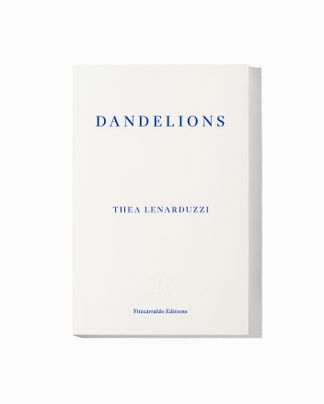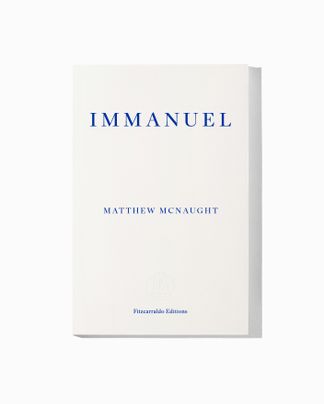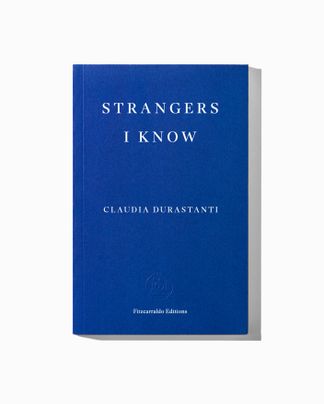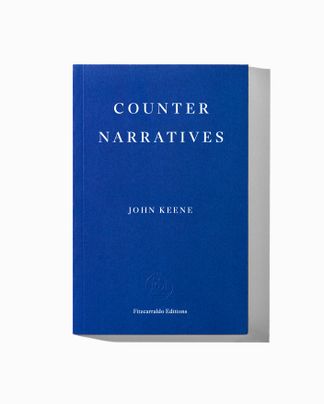Once upon a time, there was a tower on a hill, beyond the dark trees, somewhere north. An octagonal tower on two levels: glass upstairs and stone below, beneath a steep slate roof – a folly, it was said. According to locals, a young woman named Annie who fell ill was confined to the tower by her father for three years and died there, alone. Fascinated by Annie’s story, Thea Lenarduzzi attempts to piece the past together in a formidable act of imagination, which, tugging at the strings of the how, why and who of stories, begins to unravel the very idea of storytelling itself. Veering between fiction, memoir, fairy tale and folklore, The Tower is an extraordinary book about power, abuse and why we don’t always tell the story we set out to tell.
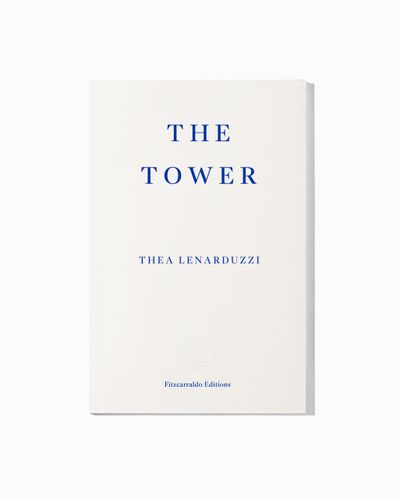
The Tower
French paperback with flaps, 248 pages | Audiobook read by Thea Lenarduzzi
Published 9 October 2025
The Tower
Once I read a story about a woman who became trapped in a suffocating vision of the afterlife, condemned to wander through time and relive her memories on a loop for ever more, so that after a while she was merely an exhausted observer of her own life and fate.
‘You think the past affects the future,’ a character says to her as she confronts for the hundredth time a particularly painful episode. ‘Has it never struck you that the future may affect the past?’
I had never thought of time as so plainly a two-way trip, and of cause and effect as return passengers. Though I couldn’t work out if it was for good or ill, I didn’t doubt for a minute that the assessment was completely and complicatedly true. Were it not, I would probably be telling you a different story now.
But before I came to know this story properly, before I came to, I think, understand it, the one I’m about to tell you, about a girl – or a woman – and a tower on a hill, I didn’t hear how, in it, the past and the future spoke to each other. I didn’t see that the past was only what it was, a tragedy, because the future had conspired to make it so. I didn’t see how, because of this whispered communion between the past and the future (a future which was, in any case, already the past to some other future), two lives became joined together, easily, as if instinctively, as if they always had been, eliding great differences, to speak as one.
Or howl. A howl of all time, like a discordant chorus cast from the heights of Babel across a flooded land, where the ground mirrors the sky and no one can be sure which way is up or down, which way back and which forwards, what happened and what was only in the mind. I fear I haven’t explained it at all clearly. But I hope you’ll come to see what I mean. Perhaps for now I should simply say that we don’t always tell the story we want to tell. We can’t always choose our place in it, nor how it ends, or if it even does. That, reader, is the stuff of fiction.
I . A GIRL
I.
Years and years ago, a man told a woman a story about a girl who died in a tower, in a place hundreds of miles north from them and more than a century past. From that moment, every few months, the woman would lead the man through the hoops of the story. But so she died in there…? Did someone tell you this or was there a plaque, something written…? They must have had the same conversation a hundred times or more, his words becoming fewer and flightier with each retelling, the weighted silence of brain-racking and hesitation taking over.
It was so long ago, he’d say, even in the early days when it wasn’t.
Information was nibbled away by the moths of forgetfulness, doubt and distraction, and she did nothing to stop holes forming. She – let’s call her T – wrote no details down, which went against her usual habit of capturing a good story, with a half-thought that she’d make use of it in some shape, at some point (you should know she made a living telling other people’s stories). The more stubborn elements – I’m not sure I can say facts – belonged to a different register, like a few scattered stones that might be bits of bone or a trick of the light that could be a human face suspended in air.
In the beginning this is what she knew: one autumn, her boyfriend, as he was at the time, went on a trip with his father, walking in the north of the country, where they encountered a strange structure, a little tower; ‘a folly’, he called it. Back home, he showed her a photograph of it on his phone and, even then, she remembered wishing he hadn’t. An octagonal tower on two levels: mostly glass upstairs and too-white masonry below, beneath a steep slate roof. The tower’s banal appearance didn’t seem to match his story, she thought, about a young woman with tuberculosis who was confined for three years by her father, and died there sometime in the early 1900s.
I called it his story just now, but she had claimed it as her own before he had stopped talking, before even she was aware of having done so.
Over the years, she found online more images like the one he had shown her, snapped by ramblers and posted with sparse and sceptical commentary. It is commonly thought… Locals believe… They say… As if those people weren’t themselves saying it, some part of them believing it, or wanting to. She wondered why they distanced themselves like that, as if they were looking down from a great height. She read them all, must have found every blog there was to be found, gulped them like cheap lemonade on a hot day. They gave her a rush. In one image, apparently photocopied and then scanned from a newspaper of the 1940s and so grainy it was almost pointillist, a cow called Daisy had found her way into the tower and peered out of an upstairs window, as if deciding what to wear for the weather. In another, the tower was in ruins, only half of the base still standing, its stone unmasked and its doorway gaping. Like an open mouth, she said to herself. Like an open grave.
For some time after the events of our story had run their course, she wished the tower still looked that way, undistinguished and grey, fuzzed by moss. She wished they had never rebuilt it, reconstructing the past, Disneyfying tragedy for just anyone walking by to notice; an ambush on the feelings and imagination, a trap for the vulnerable or foolish. She spent nights willing the thing to crumble again, picturing stones in the grass without apparent pattern or purpose. If the tower disappeared, she thought, perhaps everything else would, too.
(…)
‘Lenarduzzi’s book is a compelling read, elegant and artful, intertwining myth, fairy tale and reality. Is it a novel or a memoir? Ultimately, perhaps both.’
— Lee Langley, The Spectator
‘Thea Lenarduzzi works against the grain of her own and readers’ expectations in this graceful book, in which stories are dismantled so that new truths can be found. Beautifully considered: The Tower is both delicate and wise.’
— Anne Enright, author of The Wren, The Wren
‘A hybrid, shifting, searching work that applies pressure to the boundaries between forms before it crosses them, The Tower asks questions about stories, narrative and history – and our uneasy inheritance of them – that linger long after the book’s final pages. I couldn’t get it out of my mind.’
— Helen Charman, author of Mother State
‘Life, and writing, can expand from a detail: to which extent must this detail be personal? In this remarkable and surprising book, Thea Lenarduzzi wanders through the many paths of fiction-making, in a literary quest to find out if the girl in the tower is a romanticized symbol, an exhausted trope, a resourceful broken archive at the beginning of a powerful story, hers as much as ours. Truly fascinating and brimming with intellectual energy.’
— Claudia Durastanti, author of Strangers I Know
‘In The Tower, Thea Lenarduzzi offers a brilliant and exacting meditation on the stories we tell about a life – and the cultural and familial forces of thought that can obscure self-understanding. Tracing the fate of a young woman exiled to a stone tower after a tuberculosis diagnosis, Lenarduzzi braids archival enquiry with imaginative force, illuminating how the past shapes our present griefs and inheritances. This is a rare kind of book: intimate yet capacious, unsettling yet precise in its enquiry into harm, inheritance and the limits of language. The result is a profound reckoning with memory and silence: what we remember, what we omit and why.’
— Meghan O’Rourke, author of The Invisible Kingdom
‘The Tower is about the allure (and refusal) of certain narratives, about the sublime quest an author takes when she embarks on the act of storytelling. Its form – a composite of fiction, memoir, history – mirrors its subject matter and, excitingly, “stages” its very questions. In this elegantly composed, layered and expansive book, Thea Lenarduzzi articulates something of the mysterious nature of stories while also making an argument for all that is unknowable.’
— Lauren Aimee Curtis, author of Strangers at the Port
‘With her sensitive, fable-like unravelling of a mysterious anecdote, Thea Lenarduzzi enlists and subverts all the elements of a gripping story – a secret, a journey, doubt and denouement – to emerge with an intricately crafted meditation on the nature of narrative itself. The Tower masterfully loops back on itself and retraces its own steps to uncover the secrets, wishes and fears that lurk in the stories we tell about ourselves, and what draws us to those of others.’
— Daisy Lafarge, author of Lovebug
‘A fascinating and shapeshifting book that is simultaneously a literary pursuit and a forensic examination of power, abuse and the human scope for mythologizing. The result is pure magic.’
— Catherine Taylor, author of The Stirrings
‘In her second remarkable and equally wise book, Lenarduzzi explores how we shape and share our stories – of ourselves and of others. Some are rooted in truth, others are constructed over generations of telling, and then there are those that relate to the depths of consciousness. She leads us with lyrical and meticulous prose via convincing digressions to an unexpected place to which I feel privileged to have journeyed.’
— Julia Bueno, author of Everyone’s A Critic
Praise for Dandelions
‘Dandelions is a book of hauntings, intensely experienced, pierced by occasional terrors, yet irradiated throughout by passionate attachment. Thea Lenarduzzi has spread out before us a feast of sensuous and sensitive, nuanced and deeply appealing testimony to migration, survival and complicated identities at a time when such thoughtfulness is rare and desperately needed.’
— Marina Warner, author of Sanctuary
‘Beautifully observed and written with heart and an infectious curiosity, Thea Lenarduzzi’s Dandelions parses the complex ways in which we live out our histories and carry the past within us, through ritual, food, language and legend. Like rifling through an overflowing drawer or opening an ancient photo album, Lenarduzzi unearths glinting gems of family fiction, introducing us to a shifting cast of memorable characters whose journeys, stories and passions it’s our joy to share.’
— Francesca Wade, author of Gertrude Stein: An Afterlife
Thea Lenarduzzi is a writer, broadcaster and editor. Her debut, Dandelions, a family memoir and cultural history of migration between Italy and England, won the 2020 Fitzcarraldo Editions Essay Prize and was shortlisted for the Ackerley Prize for ‘literary autobiography of outstanding merit’. The Tower is her second book.

